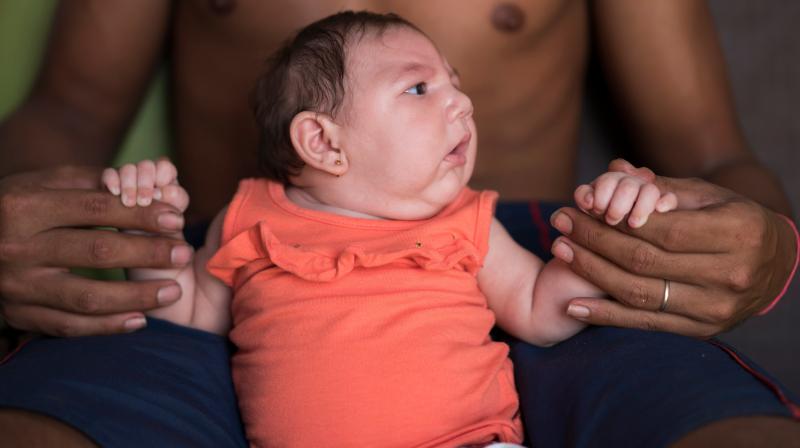Zika doctor warns Brazil against lowering guard on birth defects

The doctor who first linked the Zika virus to birth defects says Brazil has too quickly forgotten the tragedy of 2,000 babies born with smaller-than-normal heads and runs the risk of a second wave of infections if the virus mutates.
A year after the initial epidemic, public health authorities are reporting very few cases of microcephaly among newborns, a development obstetrician Adriana Melo and other researchers attribute to likely immunity among those already infected by the virus.
"We will see sporadic cases, like any virus, but Zika is here to stay," Mello told Reuters on Tuesday at her clinic for expectant mothers in northeastern Brazil, the region hardest hit by the initial wave of Zika in the Americas.
After an alarming jump in late 2015 in regional cases of microcephaly, Melo was the first scientist to ask federal researchers to test the amniotic fluid of an expectant mother whose fetus was showing brain problems, providing the first empirical link between the complication and the virus. Microcephaly often signifies arrested brain development.
Zika, a viral disease carried by mosquitoes, has spread to more than 60 countries and territories since the outbreak was identified in Brazil in 2015, raising alarm over its ability to cause microcephaly as well as Guillain-Barre syndrome. The World Health Organization said this month that Brazil and Latin America are recording lower numbers of infections than last year, but that all countries must remain vigilant.
Because at least 1.5 million Brazilians are believed to have already been infected by Zika, which often does not cause symptoms, scientists believe parts of Brazil may have already reached so-called "herd immunity," limiting further infection until the human population regenerates or the virus mutates to outmaneuver that immunity.
That is one reason why, despite the onset of the hot humid Southern hemisphere summer favorable to the virus-carrying mosquito, scientists and government officials said last October that they did not expect a second big wave of Zika infections.
But Melo, like other scientists, is warning Brazil not to drop its guard. In a decade, she warned, a new generation of mothers could be vulnerable, especially if the virus changes enough to get around those who at present may have immunity.
"The virus could mutate," Melo said, noting the four known strains of dengue, another mosquito-borne disease that is common in the tropics and able to cause repeated infections.
Little data exists to fully explain how Zika immunity may work. Research into apparent immunity among the population of French Polynesia after a 2013-2014 outbreak cannot be extrapolated to Brazil because that country is much smaller.
Although they have no proof, Melo and other scientists believe Zika was carried to Brazil from Asia by a soccer player in the 2014 World Cup. By then, it had already mutated from the virus first found in Africa in 1947.
'COULD RETURN WITH FORCE'
Here in Campina Grande, Melo's hometown in the northeastern state of Paraiba, 82 cases of microcephaly were discovered between October 2015 and March 2016. A year later, there have been just three, a decline similar to that reported in neighboring Pernambuco, the state with the highest concentration of microcephaly cases.
"People should not think there will be no Zika. It could return with force, now or later, in Sao Paulo or here in the northeast, we don't know," Melo said. "I am afraid that people are lowering their guard."
Melo said she sees Brazilians already forgetting to protect themselves from mosquitoes and neglecting to eliminate stagnant water where the insect breeds. After an initial outpouring of sympathy, Melo says that the country is also forgetting the mothers and deformed babies born a year ago. She worries the long-term assistance they need may not be available as interest wanes.
One such parent is Raquel Barbosa, a 25-year-old former patient at Melo's clinic and mother of the only twins known to have both been born with microcephaly in Brazil. The babies, Heloisa and Heloá, are still on waiting lists for surgery to straighten their twisted feet.
Barbosa has struggled to provide the constant attention needed by both. She often leaves one girl with her mother at her farm house which has no running water. Barbosa receives 480 reais ($153.95) a month in social welfare plus child disability benefit of 937 reais a month but that does not stretch far.
The local government provides transport for the one-hour trip from a suburb into Campina Grande for two free sessions of therapy a week. But she says she cannot afford the 200 reais per month needed to buy medicines against convulsions, a problem for microcephalic children, and relies on donations for nappies and powdered milk.
"The local public health office would give them to us, but there are never in stock, so we have to buy them," Barbosa said.

